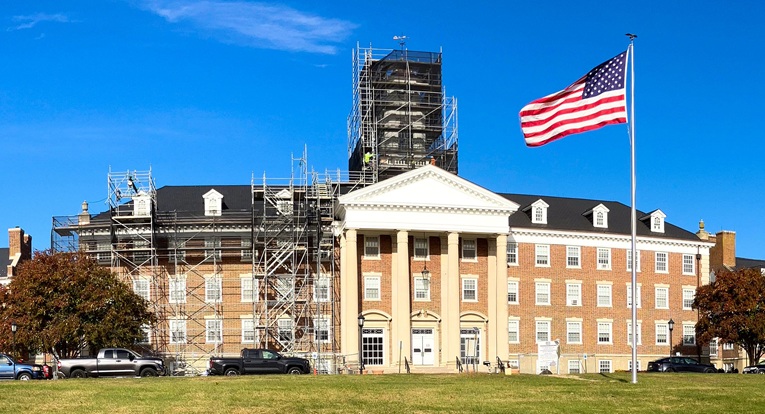Greenbelt is in excellent financial condition and its revenue stream is sound, City Treasurer Bertha Gaymon told the Greenbelt City Council at a December 28 work session. Her written report and related budget table are available on the city’s website as part of the agenda packet for the meeting.
Revenues
Gaymon calculated that real estate tax receipts to date are $19,970,847, which is $1,880,047 higher than the $18,090,800 in the adopted budget. However, all of this difference is accounted for by real estate abatements. To date, just $6,125 in abatements have been issued, compared to the $1,897,000 in the adopted budget. In calculating her projected year-end revenues, Gaymon reduced the adjustment for abatements by $1,264,667.
Year-end projections for two other taxes are, not surprisingly, well below their levels in the adopted budget given the pandemic’s effects on travel and entertainment. The hotel/motel tax is projected to be $160,000 less than the adopted budget while the admissions and amusements tax is projected to come in at nearly half a million dollars less than in the adopted budget.
Likewise, revenue from recreation programs is projected to be $669,600 less than expected. One bright spot is highway user fee revenue where Gaymon projects that the city will receive $540,776, nearly double the budgeted revenue, although these funds can only be used for specific purposes.
Gaymon did not revise estimates for all revenue sources but one other category took a major hit from efforts to spur the economy. The adopted budget expected interest revenues of $150,000. Gaymon is now projecting that the city will receive less than $10,000.
Taking all these changes into account, Gaymon projects that city revenues will be $91,900 greater than in the adopted budget.
Expenditures
The budget update does not include an analysis of expenditures, aside from Director of Recreation Greg Varda’s estimates for his department. He expects expenditures to drop by nearly $1.3 million. Mayor Colin Byrd pressed to get comparable expenditure information for other departments, which Gaymon is planning to do as part of the Fiscal Year 2022 budget review, sooner rather than later.
Current Status
Based on the revised revenue and expenditure estimates, Gaymon projects an overall savings of $1,383,200. She suggested that some of this revenue could be applied to the deferred expenditures. However, she also pointed out several potentially significant expenditures that were not provided for in the budget, such as the legal costs of fighting maglev and potential armory redevelopment costs.
Council Discussion
Council discussed Gaymon’s recommendations. Councilmember Emmett Jordan expressed concern about reducing the adjustment for abatement. These commercial property tax cuts can be made after the end of this fiscal year but retroactive to the beginning of the assessment cycle. While residential abatements tend to be small, he said he was most concerned about commercial abatements where he feared the city could be in for a big hit. While Councilmember Judith Davis professed being a bit fearful, she “sort of agree[d]” with Gaymon’s recommendation to reduce the adjustment by two-thirds.
Byrd appeared to agree with Jordan’s concern and suggested Gaymon confer with other municipalities, the city manager and assistant city manager, which Gaymon says she had done. Property tax must be paid, no matter what. Byrd countered that he had heard some commercial property owners indicating that they would not be paying their taxes.
Resident Molly Lester politely pointed out that revenue stream from a property, not the owner’s ability to pay, is the issue. Gaymon committed to conducting a more detailed review of commercial property taxes.
In addition, Davis pointed out that some of the city’s six hotels have closed either permanently or temporarily. City Manager Nicole Ard noted that the Holiday Inn went bankrupt and is now being operated by a bank. It is not known how many restaurants have closed.
There was some discussion about whether the city would still fund the School Resource Officer (SRO) program. Councilmember Silke Pope said she had been approached by someone who had heard that the SRO program would be dropped. Others had heard the same thing. Ard assured council that this program is still in the budget and that she expects to include it in the budget for next fiscal year, as well. However, Davis noted that the county, state or school board could possibly change or end the SRO program as part of their police reform efforts.
Possible Uses
Councilmembers briefly discussed possibly restoring some cuts. These include reinstating employee cost-of-living adjustments (COLA) either going forward or retroactively (full year cost $550,000), performing the employee compensation study ($75,000) and architectural space study ($30,000). There was no clear consensus although several councilmembers favored reinstating the COLA. Jordan, supported by Councilmember Edward Putens, suggested a bonus for employees who have face-to-face interaction with the public while Davis termed the proposal unfair.
Davis, while supporting the COLA, raised a major concern. “If we are going to fight maglev and Royal Farms,” she said, “the legal costs are going to eat us alive.” If the city gets the armory, council will need to look at what it will cost to renovate. She pointed out that the city needed to get a state bond issue to fund the renovation of the Community Center. There are things in the armory that we do not even know about, she worried. Other fights might include beltway widening and Beltway Plaza redevelopment.
Jordan agreed, saying that the city’s legal costs are spiraling out of control, a viewpoint disputed by Councilmember Rodney Roberts. If the city does not fight projects such as the road widening and the Bureau of Engraving and Printing plant proposed for the Beltsville Agricultural Research Center, Roberts said, our quality of life goes down.



